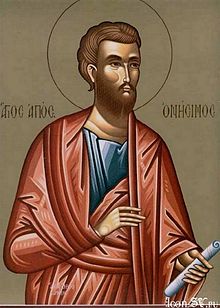Onesimus
Bishop of Byzantium from AD 54 to AD 68 From Wikipedia, the free encyclopedia
Bishop of Byzantium from AD 54 to AD 68 From Wikipedia, the free encyclopedia
Onesimus (‹See Tfd›Greek: Ὀνήσιμος, translit. Onēsimos, meaning "useful"; died c. 68 AD, according to Catholic tradition),[1] also called Onesimus of Byzantium and The Holy Apostle Onesimus in the Eastern Orthodox Church,[2] was a slave[3] to Philemon of Colossae, a man of Christian faith. He may also be the same Onesimus named by Ignatius of Antioch (died c. 107) as bishop in Ephesus[4] which would put Onesimus's death closer to 107. If so, Onesimus went from slave to brother to bishop.
Onesimus | |
|---|---|
| Bishop of Byzantium | |
 | |
| Installed | 54 |
| Term ended | 68 |
| Predecessor | Stachys the Apostle |
| Successor | Polycarpus I of Byzantium |
| Personal details | |
| Died | c. 68 |
| Denomination | Early Christianity |
Onesimus | |
|---|---|
 Painting depicting death of Onesimus, from the Menologion of Basil II (c. 1000 AD) | |
| Holy Disciple Onesimus Bishop of Byzantium | |
| Died | c. 68 AD or 81-95 AD Rome (then Roman province) |
| Venerated in | Roman Catholic Church Eastern Orthodox Church Oriental Orthodox Church Lutheranism |
| Feast | February 15 (formerly February 16 in the West) |
The name "Onesimus" appears in two New Testament epistles—in Colossians 4 and in Philemon. In Colossians 4:9[5] a person of this name is identified as a Christian accompanying Tychicus to visit the Christians in Colossae; nothing else is stated about him in this context. He may well be the freed Onesimus from the Epistle to Philemon.
The Epistle to Philemon was written by Paul the Apostle to Philemon concerning a person believed to be a runaway slave named Onesimus. The traditional designation of Onesimus as a slave is doubted by some modern scholars.[6] Onesimus turned up where Paul was imprisoned (most probably Rome or Caesarea)[7] to escape punishment for a theft of which he was accused.[8] After hearing the Gospel from Paul, Onesimus converted to Christianity. Paul, having earlier converted Philemon to Christianity, sought to reconcile the two by writing the letter to Philemon which today exists in the New Testament.[9] The letter reads (in part):
I appeal to you for my son Onesimus, whom I have begotten while in my chains, who once was unprofitable to you, but now is profitable to you and to me. I am sending him back. You therefore receive him, that is, my own heart, whom I wished to keep with me, that on your behalf he might minister to me in my chains for the gospel. But without your consent I wanted to do nothing, that your good deed might not be by compulsion, as it were, but voluntary. For perhaps he departed for a while for this purpose, that you might receive him forever, no longer as a slave but more than a slave—a beloved brother, especially to me but how much more to you, both in the flesh and in the Lord.
Though this is questioned by authorities such as Joseph Fitzmyer,[10] it may be the case that this Onesimus was the same one consecrated a bishop by the Apostles, and who accepted the episcopal throne in Ephesus[11] following Timothy. Whether in the reign of Roman emperor Domitian or the persecution of Trajan, Onesimus was imprisoned in Rome. He may have been martyred by stoning (some sources claim he was beheaded). However, since the reign of Domitian was from 81 AD to 96 AD, and that of Trajan lasted to 117, Onesimus' death would have to fall within these years and not in 68, as above.
Onesimus is regarded as a saint by many Christian denominations.
The Lutheran Church–Missouri Synod commemorates him and Philemon on February 15.[12]
The Eastern Orthodox Church commemorates Onesimus on a variety of dates.
The traditional Western commemoration of Onesimus is on 16 February.[17] But in the 2004 edition of the Roman Martyrology, Onesimus is listed under 15 February. There, he is described as "[a] runaway slave, whom the apostle Paul received to the faith of Christ while in prison, regarding him as a son of whom he had become father, as he himself wrote to Philemon, Onesimus's master".[18]
Seamless Wikipedia browsing. On steroids.
Every time you click a link to Wikipedia, Wiktionary or Wikiquote in your browser's search results, it will show the modern Wikiwand interface.
Wikiwand extension is a five stars, simple, with minimum permission required to keep your browsing private, safe and transparent.